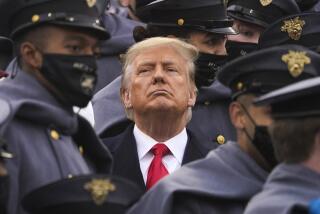How to Punish Military Men with...
- Share via
WASHINGTON — The constitutional crisis in Peru, the Haitian military’s overthrow of Jean-Bertrand Aristide and the violent turn of pro-democracy demonstrations in Thailand highlight a principal weakness in international efforts to promote democracy. There are no legal principles outlawing recognition of de facto military regimes or of those that arbitrarily breach the constitutional order. The establishment of such principles, and the creation of mechanisms for their implementation, would do much to foster democracy throughout the world.
President Alberto K. Fujimori’s actions, with military support, in Peru--dissolving Congress and jailing legislators--constituted nothing less than a military coup. The political situation in Haiti is a familiar echo: the election of a government with strong popular appeal in a country with a politicized, unruly army. And the arbitrary seizure of power by Prime Minister Suchinda Kraprayoon, a retired general, in Thailand has left the streets of Bangkok bloody.
Recognition of military governments by Western democracies, either overtly or through ambivalent signs of disapproval, ensures that unlawful seizures of power will continue. Military men leave power only when a resurgent popular will forces them to, or when their ineptitude as governors makes their situations untenable. This happened to the Argentine military following the Malvinas conflict, to the Chilean regime under Augusto Pinochet and to the Greek junta after its debacle in Cyprus.
The issue of recognizing illegal governments arises most frequently in Latin America, because of the region’s history of military takeovers of democratically elected regimes. In recent years, though, there has been a general--and commendable--tendency not to recognize governments born of a military coup, as in the case of Haiti. Unfortunately, this approach lacks international legal standing.
Given world leaders’ pledge to expand the role of the United Nations to achieve lasting peace, the General Assembly, and its Legal Commission, is the natural place to give the principle of non-recognition the force of international law.
Such a move would not be a legal aberration in the Americas. The Tobar Doctrine, developed by Ecuador’s Foreign Minister Carlos R. Tobar in 1907, urged that recognition be withheld of any government that comes to power through unconstitutional means, until a fair election is held and new leaders are elected. The Central American treaties of 1907 and 1923 also forbid recognition of any government that “may come into power in any of the five Republics through a coup d’etat or a revolution against a recognized government, as long as the freely elected representatives of the people thereof have not constitutionally reorganized the country.” More effective, however, would be the automatic non-recognition of any military regime, regardless of how it rose to power.
To be sure, the principle of non-recognition has evoked strong criticism in Latin America. The Estrada Doctrine, first stated in 1930 by Genaro Estrada, Mexico’s foreign minister, asserted that “recognition is an insulting practice” to sovereign nations, arbitrarily subjecting the internal affairs of a government to outside judgment. Although this criticism is not without merit, any validity it has would be lost if non-recognition were established as a legal principle in international court, to which all nations promise to abide.
A government’s recognition of a military regime might, of course, be in its national interest. Indeed, recognizing a government is a political as well as a legal act. The creation of a world increasingly under the rule of law, however, could justify sacrificing short-term gains for long-term objectives. A collective action of non-recognition, taken through a body like the United Nations or the Organization of American States, decreases the possibility of individual states using recognition as a form of political pressure.
Once established as a legal principle, non-recognition of military regimes could do much to eliminate the scourge of military dictatorships. By morally ostracizing these regimes, it would send a needed message throughout the world: that only democratically elected civilian governments belong to the civilized community of nations.
More to Read
Sign up for Essential California
The most important California stories and recommendations in your inbox every morning.
You may occasionally receive promotional content from the Los Angeles Times.













